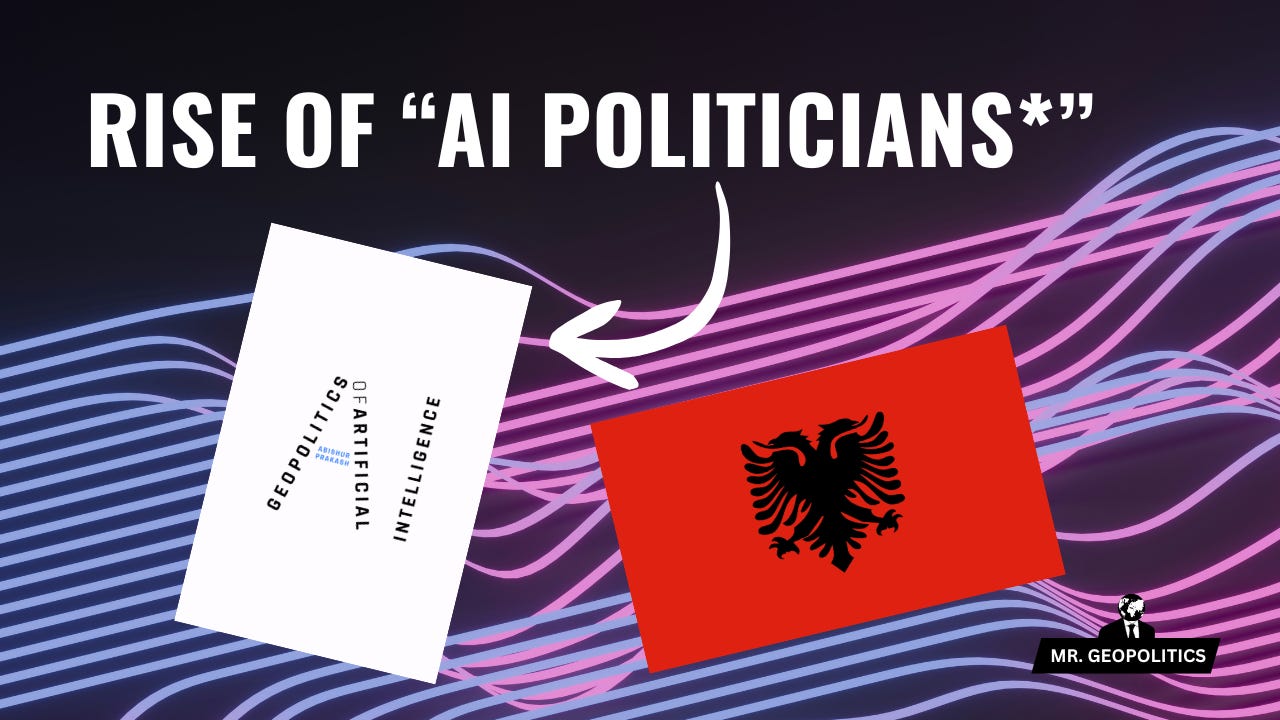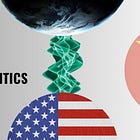The First AI Minister (And The Geopolitics of AI)
This isn’t about Diella alone — it’s the opening act of AI in global politics

Last week, Albania, a country in the Balkans with a GDP of $27 billion, did something stunning. It appointed an AI minister called “Diella” (meaning “sun” in Albanian) to clean up society, officially a “Minister for Public Procurement.” Diella was unveiled by Prime Minister Edi Rama, with a mandate of ensuring that public contracts do not involve corruption.
While Albanian parliament still has to vote on Rama’s cabinet—including Diella—it is the first time a nation has deployed an AI system this way, equal to a bureaucrat or public official. Diella is quite different from the human ministers who oversee artificial intelligence, such as in the UAE. In the case of Albania, an AI system will now “manage” a specific part of society.
In 2018, when I published the book “Geopolitics of AI,” I dedicated an entire chapter to what I call “AI politicians,” arguing that nations were reaching a point where AI may be given a certain mandate in national politics. At times, some societies have come close. In 2018, a mayoral race for a district in Tokyo saw an AI system named “Michihito Matsuda” place third. And in 2024, the UK debated using chatbots to negotiate Brexit trade deals—building on a survey from 2020 where 1 in 5 Brits said they would trust AI to handle Brexit talks.
However, in the case of Diella, it is no longer a question of “what if” or “close call.”
👁 GEOPOLITICAL FORESIGHT ON AI & GLOBAL POWER
The era of AI politicians has arrived, where AI could represent government positions once occupied by humans. Much of the world has missed the significance.
Should parliament vote Rama’s cabinet into power, Diella will represent far more than a tool to stop corruption. Considering why Diella was created, how it was created, and the state of the world, this is deeply geopolitical. It is another sign that geopolitics and AI are converging in unprecedented ways.
EU Expansion
To start with, at the core of why Albania wants to clean up corruption is joining the EU. Brussels has identified a handful of states to bring into the union in the coming years—including Albania, Serbia, and Montenegro. Before the war in Ukraine, EU expansion was all about economics. But today, geopolitics comes first. The next EU members will represent a “buffer” between Europe and Russia, as the war in Ukraine fractures the world. Albania plans to join the EU by 2030; however, joining it requires countries to “fix” problems—like corruption.
Diella, then, is not just optics. It is Albania’s very public way of showing the EU that it is tackling corruption and graft in the most creative and foolproof ways. Of course, there will be questions of oversight (covered below), but Diella could help Albania convince Europe that its corruption problems are under control.
This brings AI to the center of geopolitics.
Because, unlike in the past, when the pressure was only on countries like Albania to prove their readiness to join the EU, today, the pressure is also on the EU to bring nations on board.
Once again, geopolitics is creating headaches, like for example, with Serbia, whose president, Aleksandar Vučić, has consistently defied EU warnings to distance from Russia. Most famously, in May, Vučić attended the WW2 military parade in Moscow, standing with Russian president Vladimir Putin, even after the EU warned that Serbia could lose its bid to join the bloc. As countries like Serbia behave differently, the EU will lean more on states like Albania.
By deploying AI, Albania is improving its odds of joining the EU at a moment when Brussels is potentially losing other contenders to the changing geopolitical climate.
AI Sovereignty
Equally important is that Diella was built by Albania’s National Agency for Information Society in cooperation with Microsoft. This once again brings geopolitics into the spotlight.
Large technology firms from the US are directly or indirectly behind AI projects across the world. Alongside Microsoft in Albania, there is Stargate Norway from OpenAI.
The project in Norway—the first of its kind in Europe and one of the largest. OpenAI has set a 520MW target, meaning Stargate Norway will have enough energy to power over 500,000 homes. And it will all be renewable. In tandem, it will employ over 100,000 Nvidia GPUs by the end of next year. This will make Stargate Norway one of the largest data centers on the planet eclipsing the largest data center in China, run by China Telecom, which consumes 150MW, and is often considered the world’s biggest.
OpenAI for Countries was not only about building out local infrastructure to power AI demand. It was also about, as OpenAI put it, “democratic AI rails”—meaning rooting AI infrastructure in democratic ideas and values, rebuffing AI from communist and social states (i.e., China).
Wherever US AI is, it could block foreign AI—particularly systems from China and Russia.
Except, the case with Diella is quite different. This is not about a data center or physical infrastructure. The new government official in Albania is being partly “supplied” by a foreign firm. A few years ago, Yandex, the Google of Russia, prepared to take its AI assistant “Alice” into more markets in Eastern and Central Europe, creating fears that Russian AI was entering foreign societies.
Now, it is American AI underpinning AI politicians in other nations, science fiction just a short time ago. For the US, this is a tremendous geopolitical boost. And, once again, it puts businesses in the driver’s seat of certain geopolitics. However, for states like Albania—and the EU—questions of AI sovereignty emerge.
Nations that are deploying AI on this scale, literally being ministers of government, will be pressured to build the AI locally—to make it 100% sovereign. Yet, is this even possible for smaller states like Albania? As AI sovereignty calls grow, the big question is “how sovereign” can AI truly be if foreign companies are still building and supplying the systems?
Added to this, the EU could ring alarm bells as it seeks European tech sovereignty, highlighted with the latest 1.3 billion euro investment from ASML, the Dutch chip giant, into Mistral, the French AI firm. ASML did this to build the region’s sovereignty in technological arenas. The next condition the EU might impose on candidates like Albania is to deploy local, European technologies throughout the society, putting the US, Microsoft, and Diella in the crosshairs.
Oversight & Pushback
There are big questions regarding oversight of Diella—how it analyzes for corruption, how it proves its transparency, where the data is stored, who has access to the data, and, most importantly, how susceptible to manipulation the AI system is. None of this is clear at the moment.
But, once again, it is geopolitical.
If Diella is hacked or is caught in controversy (e.g., did not catch corruption in a public tender), the blame could fall on Microsoft. This means a US technology firm is now in charge of “securing” the biggest anti-corruption move in Albania’s modern history. It makes Albania reliant on the US in a new way.
However, there is also the question of who might hack Diella and what Diella might find. As nations tussle for influence, capital flows into regions like the Balkans have gone under the radar. Yet, Diella could pick up contracts or projects that it flags as suspicious, threatening the geopolitics of other nations. Could Diella spot something strange in a contract from a Turkish firm, over potential links to Russia? Or could Diella identify irregularities in a Chinese bid? Of course, much of this will depend on the overall complexity of Diella as a system and how big its mandate really is, meaning what kind of data sets it has access to and what it is tasked with (and what it is not tasked with). As Albania and other nations think of their own Diella, they must realize that they are opening “geopolitical doors” by deploying such AI systems. What these AI politicians do may generate new tensions.
And if some nations feel locked out or threatened, they could resort to paralyzing the AI systems or attempting to manipulate/control them through cyber attacks/hacking.
There is also the social pushback in Albania. A leading opposition figure in the country, Gazmend Bardhi, has referred to Diella as “unconstitutional.” Even Albania’s president, Bajram Begaj, who has instructed Rama to create a cabinet, has not fully endorsed Diella. An AI system is generating the new political tensions in Albania. And, there is no clarity on whether Albanian society—the people—are ready to accept an AI politician going after corruption. Such variables are equally relevant when it comes to the interplay between AI, nations, and politics.
Conclusion
Diella’s life may be short-lived. Either Rama might pull the AI system to move his cabinet vote through, or the AI might be scrapped entirely in the near term for a human minister. But Diella’s future is no longer the most important point. What Albania has done is a sign that AI, politics, and the fight for global power are not far off in the distance. They are occurring in real time. And countries that never get the spotlight are ready to take steps that nations with the spotlight are anxious about (e.g., how ready are the US or China to deploy an AI minister).
The big question is not what happens next with Diella, but which nations will be next to create their own version of Diella. The world has entered a new chapter where AI politicians could pop up everywhere, as nations seek powerful and transparent ways to address problems. And behind these AI politicians are likely to be a spectrum of “geopolitical characters”—countries and companies—competing to call the shots in the most unlikely yet powerful ways.
Suddenly, AI politicians, once unthinkable, are no longer a headache. It is: who built them, who supplies them, and ultimately, who controls them.
-ABISHUR PRAKASH AKA. MR. GEOPOLITICS
Mr. Geopolitics is the property of Abishur Prakash/The Geopolitical Business, Inc., and is protected under Canadian Copyright Law. This includes, but is not limited to: ideas, perspectives, expressions, concepts, etc. Any use of the insights, including sharing or interpretation, partly or wholly, requires explicit written permission.
Have questions or thoughts? Let’s talk: mrgeopolitics@substack.com
If you like Mr. Geopolitics, your colleagues might too.
Feel like doing something unique for somebody important?








